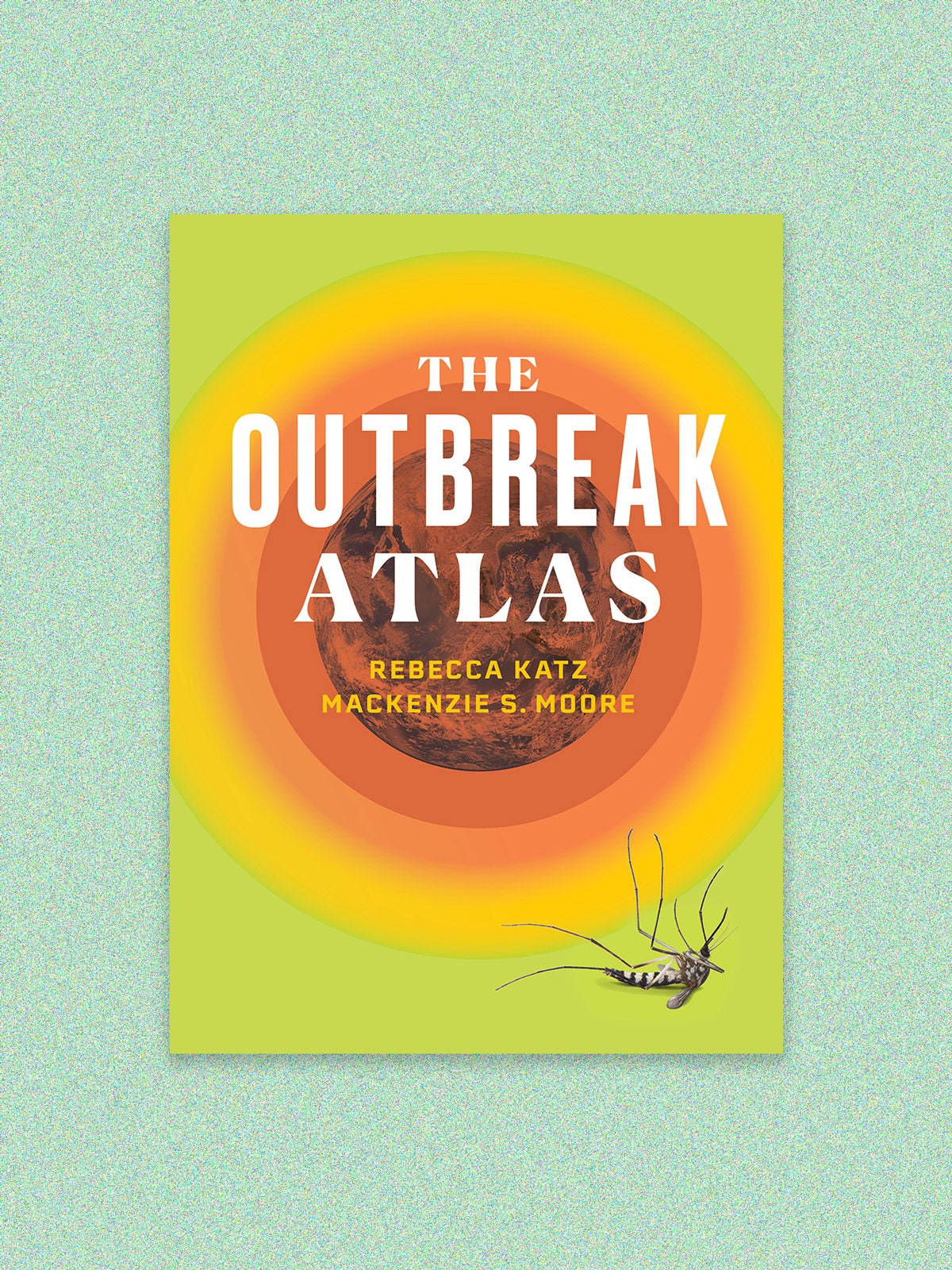
Book
A user’s manual for the next pandemic
Outbreak Atlas is the book you want on your shelf if—or when—the next pandemic comes. Authors Rebecca Katz, who directs the Center for Global Health Science and Security at Georgetown University, and Mackenzie Moore, a scientist at the center, pull back the curtain on the considerations, procedures, and decision-making that go into managing an outbreak—how to prepare, how to respond, how to rebuild in the aftermath. As they write, “[W]e have designed this book to welcome you into the world of outbreaks.”
The handbook they’ve written feels essential, even if it’s for a moment that many people might not want to think about right now. But it should be a source of comfort to know there’s an ambitious but approachable handbook covering everything from basic epidemiology to mitigation measures and biosecurity.
Sign up for Harvard Public Health
Delivered to your inbox weekly.
One of the most refreshing things about this book is the direct and timely treatment of key concerns the pandemic revealed. These are presented in cogent, clear, and approachable prose suitable for those with little or no epidemiologic background. The authors examine public health communication, community-based disease surveillance, disease mitigation measures, and biosecurity, which focuses on procedures for protection from and control of pathogens. They organize the work as a user’s manual, further underlining the utility they hope “armchair epidemiologists” can find in its pages.
The very idea of armchair epidemiologists was, of course, controversial during the pandemic, and the controversy puts some principles of public health front and center. For example, it is true that public health cannot function as intended apart from an engaged public, but not all engagement is equal. Epistemic trespassing, also referred to as the Dunning-Kruger effect, describes a cognitive bias wherein people overestimate their own capabilities or make a foray into a field outside of their expertise, offering exposition without competence. As Dunning himself warned in June 2020: “Roaming into a field without expert-level insight, trespassers easily slip up.”
At the same time, Katz and Moore underscore the helpful role of the public in rooting out misinformation through questioning and fact checking—helpful, that is, if public discourse can stay mindful of sharing only accurate information and remaining flexible as understanding of the disease and response may change over time.
Nevertheless, this book initiates a needed conversation between public health and the public, bridging the worlds between research and everyday life. As America’s collective trust in public entities and scientists begins to border on abysmal, while the probability of extreme outbreaks is projected to increase, Outbreak Atlas is a timely outreach.
Book cover: Vanderbilt University Press
Republish this article
<p>How to prepare, respond, and rebuild in the aftermath</p>
<p>Written by Madeline Roberts</p>
<p>This <a rel="canonical" href="https://harvardpublichealth.org/policy-practice/review-pandemic-book-by-rebecca-katz-and-mackenzie-moore/">article</a> originally appeared in<a href="https://harvardpublichealth.org/">Harvard Public Health magazine</a>. Subscribe to their <a href="https://harvardpublichealth.org/subscribe/">newsletter</a>.</p>
<p><em>Outbreak Atlas</em> is the book you want on your shelf if—or when—the next pandemic comes. Authors Rebecca Katz, who directs the Center for Global Health Science and Security at Georgetown University, and Mackenzie Moore, a scientist at the center, pull back the curtain on the considerations, procedures, and decision-making that go into managing an outbreak—how to prepare, how to respond, how to rebuild in the aftermath. As they write, “[W]e have designed this book to welcome you into the world of outbreaks.”</p>
<p>The handbook they’ve written feels essential, even if it’s for a moment that many people might not want to think about right now. But it should be a source of comfort to know there’s an ambitious but approachable handbook covering everything from basic epidemiology to mitigation measures and biosecurity.</p>
<p>One of the most refreshing things about this book is the direct and timely treatment of key concerns the pandemic revealed. These are presented in cogent, clear, and approachable prose suitable for those with little or no epidemiologic background. The authors examine public health communication, community-based disease surveillance, disease mitigation measures, and biosecurity, which focuses on procedures for protection from and control of pathogens. They organize the work as a user’s manual, further underlining the utility they hope “armchair epidemiologists” can find in its pages.</p>
<p>The very idea of armchair epidemiologists was, of course, controversial during the pandemic, and the controversy puts some principles of public health front and center. For example, it is true that public health cannot function as intended apart from an engaged public, but not all engagement is equal. Epistemic trespassing, also referred to as the <a href="https://thedecisionlab.com/biases/dunning-kruger-effect">Dunning-Kruger</a> effect, describes a cognitive bias wherein people overestimate their own capabilities or make a foray into a field outside of their expertise, offering exposition without competence. As Dunning himself warned in June 2020: “Roaming into a field without expert-level insight, trespassers easily slip up.”</p>
<p>At the same time, Katz and Moore underscore the helpful role of the public in rooting out misinformation through questioning and fact checking—helpful, that is, if public discourse can stay mindful of sharing only accurate information and remaining flexible as understanding of the disease and response may change over time.</p>
<p class=" t-has-endmark t-has-endmark">Nevertheless, this book initiates a needed conversation between public health and the public, bridging the worlds between research and everyday life. As America’s collective trust in public entities and scientists <a href="https://www.pewresearch.org/science/2023/11/14/americans-trust-in-scientists-positive-views-of-science-continue-to-decline/" target="_blank" rel="noreferrer noopener">begins to border on abysmal</a>, while the probability of extreme outbreaks is projected to <a href="https://www.pnas.org/doi/10.1073/pnas.2105482118" target="_blank" rel="noreferrer noopener">increase</a>, <em>Outbreak Atlas</em> is a timely outreach.</p>
<script async src="https://www.googletagmanager.com/gtag/js?id=G-S1L5BS4DJN"></script>
<script>
window.dataLayer = window.dataLayer || [];
if (typeof gtag !== "function") {function gtag(){dataLayer.push(arguments);}}
gtag('js', new Date());
gtag('config', 'G-S1L5BS4DJN');
</script>
Republishing guidelines
We’re happy to know you’re interested in republishing one of our stories. Please follow the guidelines below, adapted from other sites, primarily ProPublica’s Steal Our Stories guidelines (we didn’t steal all of its republishing guidelines, but we stole a lot of them). We also borrowed from Undark and KFF Health News.
Timeframe: Most stories and opinion pieces on our site can be republished within 90 days of posting. An article is available for republishing if our “Republish” button appears next to the story. We follow the Creative Commons noncommercial no-derivatives license.
When republishing a Harvard Public Health story, please follow these rules and use the required acknowledgments:
- Do not edit our stories, except to reflect changes in time (for instance, “last week” may replace “yesterday”), make style updates (we use serial commas; you may choose not to), and location (we spell out state names; you may choose not to).
- Include the author’s byline.
- Include text at the top of the story that says, “This article was originally published by Harvard Public Health. You must link the words “Harvard Public Health” to the story’s original/canonical URL.
- You must preserve the links in our stories, including our newsletter sign-up language and link.
- You must use our analytics tag: a single pixel and a snippet of HTML code that allows us to monitor our story’s traffic on your site. If you utilize our “Republish” link, the code will be automatically appended at the end of the article. It occupies minimal space and will be enclosed within a standard <script> tag.
- You must set the canonical link to the original Harvard Public Health URL or otherwise ensure that canonical tags are properly implemented to indicate that HPH is the original source of the content. For more information about canonical metadata, click here.
Packaging: Feel free to use our headline and deck or to craft your own headlines, subheads, and other material.
Art: You may republish editorial cartoons and photographs on stories with the “Republish” button. For illustrations or articles without the “Republish” button, please reach out to republishing@hsph.harvard.edu.
Exceptions: Stories that do not include a Republish button are either exclusive to us or governed by another collaborative agreement. Please reach out directly to the author, photographer, illustrator, or other named contributor for permission to reprint work that does not include our Republish button. Please do the same for stories published more than 90 days previously. If you have any questions, contact us at republishing@hsph.harvard.edu.
Translations: If you would like to translate our story into another language, please contact us first at republishing@hsph.harvard.edu.
Ads: It’s okay to put our stories on pages with ads, but not ads specifically sold against our stories. You can’t state or imply that donations to your organization support Harvard Public Health.
Responsibilities and restrictions: You have no rights to sell, license, syndicate, or otherwise represent yourself as the authorized owner of our material to any third parties. This means that you cannot actively publish or submit our work for syndication to third-party platforms or apps like Apple News or Google News. Harvard Public Health recognizes that publishers cannot fully control when certain third parties aggregate or crawl content from publishers’ own sites.
You may not republish our material wholesale or automatically; you need to select stories to be republished individually.
You may not use our work to populate a website designed to improve rankings on search engines or solely to gain revenue from network-based advertisements.
Any website on which our stories appear must include a prominent and effective way to contact the editorial team at the publication.
Social media: If your publication shares republished stories on social media, we welcome a tag. We are @PublicHealthMag on X, Threads, and Instagram, and Harvard Public Health magazine on Facebook and LinkedIn.
Questions: If you have other questions, email us at republishing@hsph.harvard.edu.


